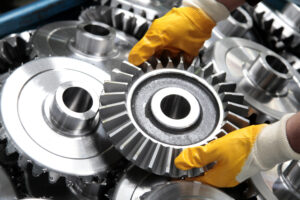 If you’re involved in manufacturing, you’re probably familiar with abrasive flow machining (AFM). AFM is a finishing process that uses an abrasive medium to smooth and polish a workpiece by removing burrs and other surface imperfections. The abrasive flow media can be custom formulated for use on components made from a wide range of materials, including metals, plastics, ceramics, and resins.
If you’re involved in manufacturing, you’re probably familiar with abrasive flow machining (AFM). AFM is a finishing process that uses an abrasive medium to smooth and polish a workpiece by removing burrs and other surface imperfections. The abrasive flow media can be custom formulated for use on components made from a wide range of materials, including metals, plastics, ceramics, and resins.
Many manufacturers in Pennsylvania include abrasive flow machining and abrasive flow media as part of their finishing processes. Aerospace, automotive, food processing, medical, consumer products, and energy producers are just a few of the industries that rely on AFM to accurately finish parts to precise specifications. AFM has many finishing applications, such as deburring, edge radiusing, surface smoothing, and sizing, that can improve the performance, durability, and quality of finished parts.
Advantages of Abrasive Flow Machining
The AFM process provides a number of advantages over other finishing methods, such as:
- AFM provides an efficient, cost-effective means to smooth, polish, and remove burrs and other surface imperfections from a workpiece.
- AFM can be used on a wide range of materials. Almost any kind of metal part, from aluminum to titanium, can be deburred using AFM.
- AFM can smooth and polish parts with complex geometries (such as slots or interior chambers) and radii that would be impossible to reach using other deburring methods.
- The AFM process can be precisely controlled to meet a manufacturer’s exact specifications.
- Consistent and repeatable results.
Selecting the Right Abrasive Flow Media to Get the Job Done
The key to the success of any AFM job is selecting the right abrasive flow media for the project. There is a wide range of abrasive materials to choose from, including aluminum oxide, silicon carbide, boron carbide, and even polycrystalline diamonds. Some of the factors manufacturers consider when selecting an abrasive flow media for a project include:
- The material being worked on. An abrasive media that’s too hard could damage a workpiece; one that’s too soft may not be as effective at deburring and polishing.
- The type of surface finish required. Generally, abrasive flow media with finer grits produce smoother finishes.
- The geometry of the workpiece. A thinner media may be required for parts with small channels and interior cavities.
The rate at which the abrasive flow media smooths and deburrs a workpiece depends on its composition, flow rate, particle size, abrasive concentration, and viscosity.
Deburring & Finishing Technologies is Your Source for Abrasive Flow Media in Pennsylvania
Looking for a reliable supplier of high-quality abrasive flow media in Pennsylvania? Give Deburring & Finishing Technologies a call. We’re a leading provider of abrasive flow media in Pennsylvania. In addition to offering more than 50 different abrasive flow media options, we have the capabilities to formulate a media specifically suited for your job’s requirements.
Deburring & Finishing Technologies is a company built to meet the AFM needs of manufacturers throughout the state of Pennsylvania. We’ve been offering high-quality abrasive flow machining equipment, media, and services to Pennsylvania businesses since 2009. Contact Deburring & Finishing Technologies through our website or call us at (412) 849-1522 to learn more about our services and get a quote.
